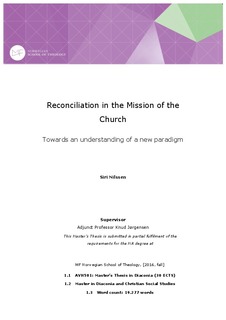Reconciliation in the Mission of the Church: Towards an understanding of a new paradigm
Master thesis
Permanent lenke
http://hdl.handle.net/11250/2432751Utgivelsesdato
2016Metadata
Vis full innførselSamlinger
Sammendrag
There has in the last decades emerged an understanding of a new paradigm in the mission of the church, namely: reconciliation. In this thesis I seek to mainly look at three different documents: The Emergence of Reconciliation as a Paradigm of Mission, Africae Munus and The Cape Town Commitment. And by analyzing and compare the three, move towards a better understanding of this new paradigm. My main research question will be: Which main perspectives on reconciliation in the church’s mission do we find in the three documents; Africae munus, The Cape Town Commitment and Emergence of Reconciliation as a Paradigm of Mission. The method I have chosen for the thesis is a hermeneutic method, interpretation of the written word.
I start the thesis by defining two central terms: Reconciliation and Paradigms. I chose to define the term reconciliation in the theological sphere, therefor excluding most of the social and secular understanding of it. I also show how David J. Bosch defines and uses the term paradigm in regards to theology. And that this understanding of the term is somewhat different from the term used in natural science.
After this I present the content of the three documents, trying to extract what they all say about reconciliation in the mission of the church. After having presented the different documents I primarily look at the similarities found. There are much more similarities than differences. Both this and the fact that reconciliation has such a prominent place in all the documents supports largely the notion of reconciliation as a new paradigm in the mission of the church.
